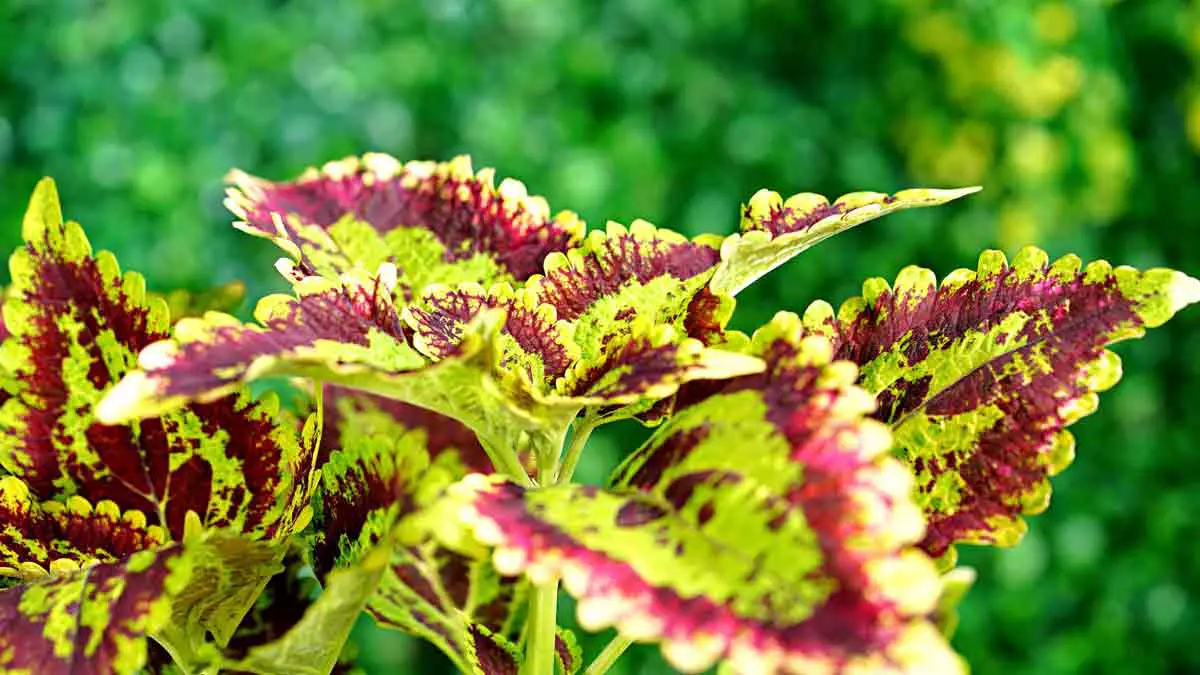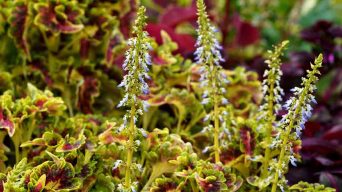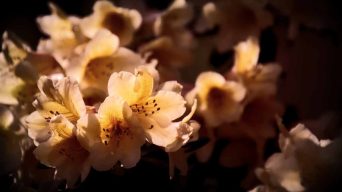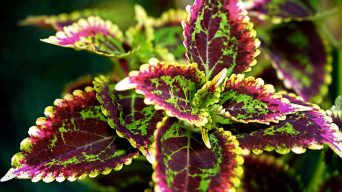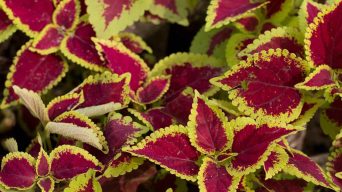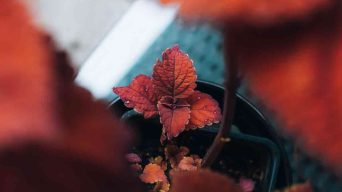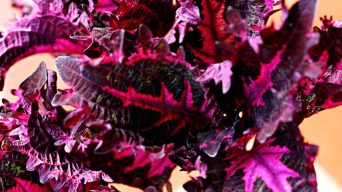Most coleus plants prefer light shade or strong indirect light and will grow in full sun to partial shade, but too much sun can scorch and fade foliage. Varieties like Colorblaze Golden Dreams and Honey Crisp tolerate strong shade, while others like Wasabi can handle full sunlight.
The Coleus plant is a popular and easy-to-grow houseplant prized for its vibrant foliage that comes in a variety of colors.
It is also an attractive garden plant, used as an annual or perennial, depending on the climate.
Knowing how much sun or shade Coleus plants need can help them thrive in any environment.
Understanding Coleus light requirements are essential to creating the perfect conditions for these plants to flourish indoors or outdoors.
Light Requirements for Coleus
Coleus is a beautiful foliage plant that comes in various colors and can add vibrancy to any garden. But do Coleus plants like sun or shade?
Let’s explore the light requirements for this unique flower to ensure your garden looks its best.
Overview of Coleus Light Preferences
Coleus plants do best in either light shade or strong indirect sunlight.
Direct sunlight, especially during the midday hours, can burn their foliage and cause discoloration.
Some modern varieties of Coleus can handle full sun, but it is important to find the right balance between sun and shade.
The exact light exposure of Coleus depends on the variety you have.
Morning Sun and Afternoon Shade
For most Coleus varieties, it is best to provide them with morning sun and afternoon shade.
This means providing direct sunlight for a few hours in the mornings, with indirect or filtered light during the hottest part of the day.
This will help your plants get enough light while avoiding any potential sunscald that could occur from too much heat and ultraviolet radiation.
Explanation of Shade and Full Sun Conditions for Coleus
When it comes to Coleus plants, shade means providing light indirect or filtered light.
This kind of lighting can help reduce the chances of sunscald while still providing enough natural light for your plants to thrive.
Full sun conditions mean providing 6 hours or more of direct sunlight each day, which should only be done with modern varieties adapted to do so.
Best Coleus Varieties for Shade
Coleus is a beautiful and versatile plant that can be grown in sun and shade.
While many varieties of coleus can tolerate full sun, most will thrive in at least dappled shade or with direct sun limited to morning hours.
If you’re looking for the best coleus varieties for shade, there are some great options to choose from.
1. Honey Crisp
Honey Crisp is one of the most popular coleus plant varieties for shade gardens. This variety has large, bright green leaves with yellow veins running through them.
The leaves have a unique texture and look great when planted in containers or along walkways.
2. Cranberry Bog
Cranberry Bog is another great option for shade gardens. This variety has deep burgundy-red leaves with dark green veins running through them.
The contrast between the two colors makes this coleus variety truly eye-catching!
3. Stained Glassworks Molten Lava and Eruption
Stained Glassworks Molten Lava and Eruption are two more excellent choices for shade gardens.
These varieties have striking red and orange leaves with yellow veins running through them, giving them an almost molten lava-like appearance!
They’re sure to make your garden stand out from the rest!
4. Red Head
Finally, Red Head is a great choice if you want to add bold color to your shade garden. This variety has bright red leaves with dark green veins running through them – perfect for adding a pop of color to any shady spot in your yard!
No matter which coleus variety you choose, they all make great additions to any shade garden!
Best Coleus Varieties for Full Sun
If you’re looking for coleus varieties that can do well in full sun, there are a few modern varieties worth considering.
Let’s look at some of the best coleus varieties for full sun gardens.
1. Sunshine Fiesta
Sunshine Fiesta is an excellent choice for full sun gardens.
This variety has bright yellow leaves with dark green veins running through them, creating an eye-catching contrast that will add a pop of color to any sunny spot in your yard.
2. Bright Ideas and Green Neon
Bright Ideas and Green Neon are two more options for full sun gardens.
These coleus varieties have lime-green leaves with contrasting yellow veins running through them, giving them a unique appearance that is sure to stand out from the rest!
3. Trailing Red Velour
If you’re looking for something truly unique, you can’t go wrong with Trailing Red Velour.
This variety has deep red leaves with darker red veins running through them, making it the perfect choice if you want something bold and beautiful in your garden.
4. Blushing Bride
Finally, Blushing Bride is another great choice for full sun gardens.
This variety has light pink leaves with green veins running through them, creating an elegant contrast that will bring beauty and sophistication to your backyard!
Signs Of Coleus Getting Too Much Light
Coleus plants are known for their vibrant colors and unique shapes, making them a popular choice for many gardeners.
But too much light can harm your Coleus plant, causing it to wilt and lose its color.
Here are some of the signs that your Coleus is getting too much light:
- Brown Leaves.- A clear indicator that your Coleus is receiving excessive light is the development of brown leaves. This occurs when the intensity of sunlight surpasses the plant’s tolerance, leading to dehydration and a loss of its vibrant color.
- Wilting Leaves.- Another sign that your Coleus is getting too much light is if its leaves start to wilt. This happens when the sun’s rays cause the plant to lose moisture faster than it can absorb it from the soil.
- Sunscald.- Another sign of too much light for your coleus is sunscalding. Sunscalding occurs when the leaves are exposed to intense heat for an extended period of time, causing them to become dry and brittle. To avoid this from happening, make sure to keep your coleus in a shaded area with indirect sunlight during hot summer days.
- Stunted Growth.- If your Coleus isn’t growing as quickly as you expect, this could be a sign that it’s getting too much light. When exposed to intense sunlight, plants will often stop growing to conserve energy and protect themselves from further damage.
- Dry Soil.- Finally, if you notice that the soil around your Coleus is dryer than usual, this could be another sign that it’s getting too much light. The sun’s rays can cause water to evaporate more quickly from the soil, leaving it dry and unable to provide enough moisture for your plant.
These are just a few signs that your Coleus may be getting too much light.
If you notice any of these symptoms, move your plant away from direct sunlight and make sure it gets enough water and nutrients.
Signs Of Coleus Getting Too Little Light
Coleus is a beautiful and vibrant plant that adds life to any garden. However, it can suffer from various issues if it doesn’t get enough light.
Here are some signs of Coleus getting too little light:
- Less Vibrant Foliage.- One of the most obvious signs of Coleus getting too little light is its foliage losing its vibrancy. The leaves will start to turn green and look dull and faded. The leaves’ colors won’t be as bright as they should be.
- Plant Leaning Towards the Light Source.- Another sign that your Coleus isn’t getting enough light is if it starts stretching and leaning toward the nearest light source. This is because it’s trying to get as much sunlight as possible to survive.
- Leaves Curling Upwards.- The leaves of your Coleus may also start curling if it’s not getting enough light. This is a sign that the plant isn’t receiving enough energy from the sun, so it’s trying to conserve energy by curling up its leaves.
- Too Much Moisture in the Soil.- Too much moisture in the soil can also be a sign that your Coleus isn’t getting enough light. If there’s too much water in the soil, then your plant won’t be able to absorb enough sunlight and will suffer from a lack of nutrition.
If you notice any of these signs with your Coleus plants, then make sure you give them more access to sunlight or move them closer to a window where they can get more direct sunlight.
Final Thoughts
When it comes to whether Coleus plants like sun or shade, achieving the right balance between the two is the key to success.
Ideally, choose a spot with morning sun and afternoon shade to ensure your coleus looks its best.
Different varieties of coleus may do better in more sun or shade, so keep an eye on your plants and move them if their leaves look faded or scorched.
With the right light balance, you can give your coleus plants the care they need and enjoy their gorgeous foliage all season long!

